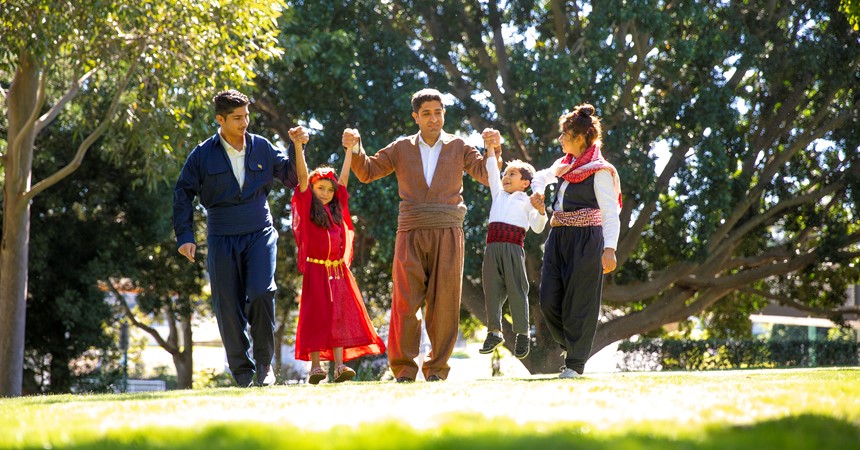Khurshid and his family arrived in Newcastle in September 2018 and are just one of the many families forming part of the community at the CatholicCare Refugee Hub.
Throughout the world there are an estimated 30-45 million Kurdish people. Due to their status as an ethnic minority group, they have never been able to establish an autonomous nationstate, except for in the small Iraqi Kurdistan region.
Successive Syrian governments have implemented policies to repress Kurdish cultural identity in the country, including banning the use of the Kurdish language, refusing to register children with Kurdish names, and replacing Kurdish names with new Arabic names.
“Life was difficult in Syria,” Khurshid, who worked as a welder, said. “In every family, at least two or three people will work so you can afford bread or clothes.”
As the Syrian civil war intensified in 2013, Khurshid and his wife Sanaa were faced with an unimaginable decision: stay and potentially jeopardise their growing family’s safety, or leave their wider family and friends behind in pursuit of a better life.
Travelling by foot, Khurshid and Sanaa fled their homeland with their five children: Sozdar (16), Hussein (15), Jihan (12), Nazdar (8) and Dilgash (6).
“On the day we left Syria to travel to Kurdistan, our daughter Nazdar was barely six weeks old, the temperature was high, and we walked for about 10 hours,” Khurshid says.
The Sarokhans lived in Iraqi-Kurdistan for five years, followed by a refugee camp in Dubai before being given a list of four countries to which they could immigrate.
“I did not know anything about Australia, except that it was safe and very beautiful,” he says.
Trading the war-torn Syria for the sandy shores of Newcastle brought a huge sense of relief to the Sarokhan family, but it was not without its own set of challenges.
“Before coming to Australia I did not speak any English,” he says. “I spoke two languages, Kurdish and Arabic.”
Between the new language, loss of wider family, community, and culture, the Sarokhan family was left feeling isolated in their new country. Australia may have been their country, but it was not their home.
That was until John Sandy came knocking on their door. John is a social worker at the CatholicCare Refugee Hub, with a primary ambition of assisting refugees settle into the Australian way of life. As a former refugee himself, John is uniquely able to empathise and empower refugees on their journey to independence.
Since John’s first visit to the family two and-a-half years ago, the Sarokhans have taken up every opportunity the Refugee Hub has offered. If you stop by the Refugee Hub on Church Street, you will be hard-pressed to find a photo not featuring the Sarokhan family.
Khurshid and Sanaa attend the weekly English classes, as well as the Men’s Program and Women’s Group. Their children have also taken part in the Bike Safety Workshop, Community Soccer Project and Beach Safety Workshop. The aim of these groups is to provide a safe space for refugees to make connections, develop their confidence and language skills, and to gain knowledge that will assist them to integrate into Australian society.
“I have made friends,” Khurshid says. “I’m happy that I get to connect with these people for parties, to go to the beach and to have barbecues.”
There’s no doubt the Sarokhans have fully embraced the Novocastrian way of life, with most weekends spent swimming or fishing at Nobbys Beach. They have also been sharing their culture and traditions with their local community, cooking up more two hundred kebabs for their children’s school!
While their three-bedroom Jesmond home may be bursting at the seams, it is also overflowing with gratitude and love.
Khurshid hopes that by moving to Australia his children will grow up with a quality education that will enable them to follow their dreams. “I am very happy that I came to Australia. My children are very happy and have everything [they need] here.
“Syria is my country and Australia is my country,” he says. “Everything is good – the most important thing is safety for my family."






















































































